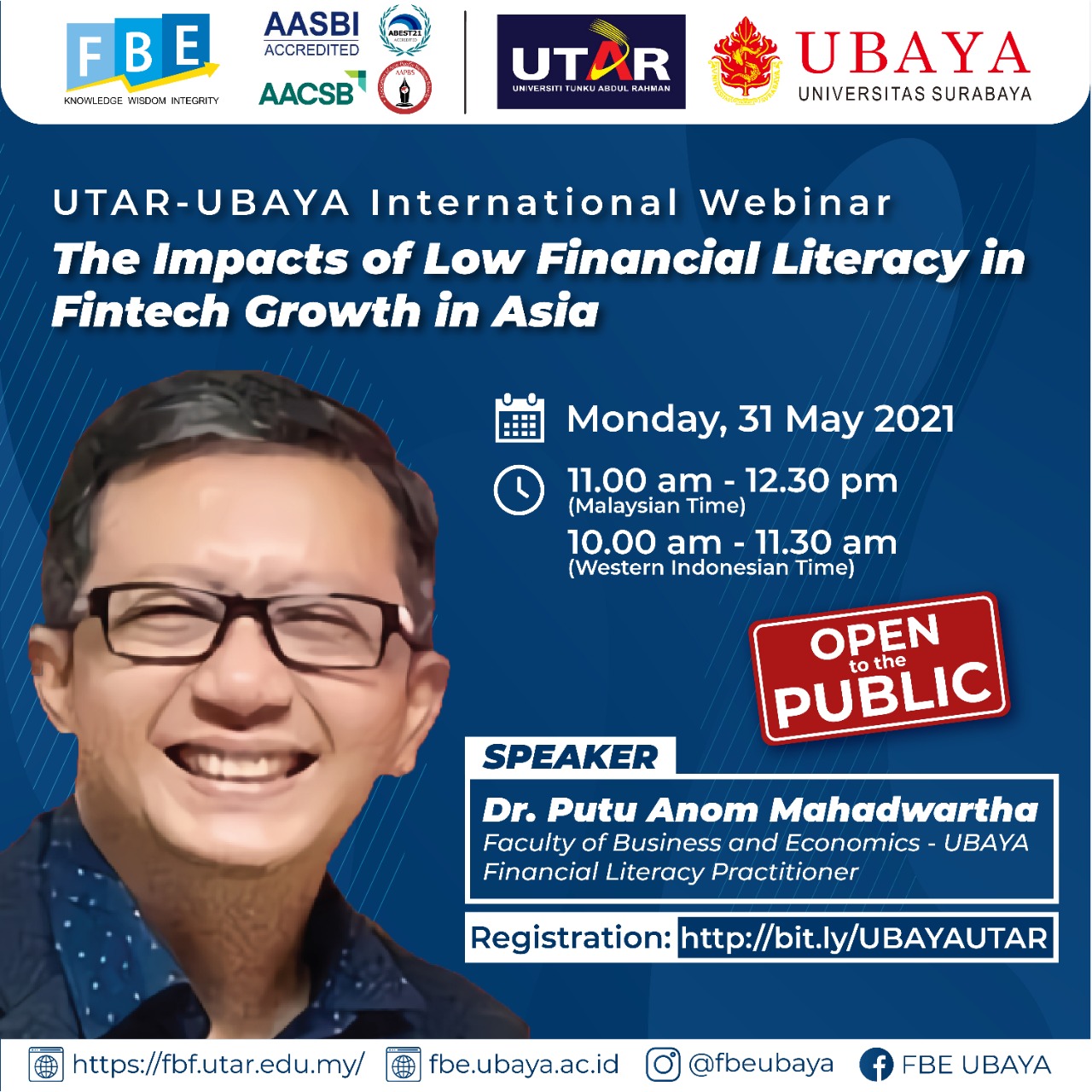
In line with the UTAR-UBAYA International Webinar series,
UTAR
Centre for Accounting, Banking
and Finance (CABF) parked under the
Faculty of Business and Finance (FBF)
collaborated with Universitas Surabaya (UBAYA) Faculty of Business and
Economics to organise its first webinar titled “The Impacts of Low Financial
Literacy in Fintech Growth in Asia” on 31 May 2021 via Zoom.
Invited to speak at the webinar was UBAYA Faculty of Finance and Economics
Dean Dr Putu Anom Mahadwartha. Also present at the webinar were UTAR FBF
Head of Programme for MBA (Corporate Management) Dr Ng Chee Pung, lecturers
and students from both universities.

Dr Putu from UBAYA sharing the impacts of low financial literacy in fintech
growth in Asia
Dr Putu started his webinar by introducing the concept of financial
literacy. He explained, “Financial literacy is the ability to understand and
effectively use various financial skills. Broadly, financial literacy is
comprised of personal financial management, budgeting and investing.
Specifically, financial literacy includes the ability to calculate income,
establish and adhere to a budget, manage cash flows, prioritise savings,
understand credit cards, protect one’s identity, learn about credit score,
and save for retirement. These competencies can be grouped into five core
competencies of earning,
namely saving, investing, spending,
borrowing and protecting.”
Dr Putu then moved on to discuss the challenges of financial literacy. He
expressed, “The challenges of financial literacy include the lack of
financial knowledge, the overconfidence of financial knowledge, and the lack
of planning. Other challenges include inadequate frameworks and regulations
from the government as well as the deferring of initiatives in the financial
industry.”
.jpg)
Dr Putu explained the challenges of financial literacy
In his sharing session, Dr Putu highlighted that the financial literacy of
Southeast Asia countries is lower than the global average. “Except for
Singapore and Myanmar, other countries in Southeast Asia showed an
Except for Singapore and Myanmar, other countries in Southeast Asia showed
an average of 30% financially literacy among the adult population. The
general financial ignorance has led to poor financial decisions resulting in
perpetual debts and situations of excessive borrowings over savings.
Dr Putu also spoke about the current fintech revolution. He told the
participants that the current fintech revolution is driven by AI and
industries consolidations. As a result, the funding for fintech start-ups
has grown from US$3.6billion to US$39.6billion in just three years.
“Using AI and machine learning, various fintech applications have been
developed in countries such as Indonesia, Malaysia and the Philippines to
allow for the automation of customer engagement in improving conversions,
increasing user retention rates with personalised campaigns as well as
tailoring user experiences to boost app launches. At the same time,
consolidation among industries has resulted in new partnerships among
traditional banks and start-ups, and mergers and acquisition,” Dr Putu said.
.jpg)
Dr Putu presenting data on consolidated industry
Finally, he concluded his presentation by emphasising the importance of
financial literacy in an era of fintech proliferation. According to Dr Putu,
with the fintech revolution, more fintech is gaining access to the personal
finance and lending profiles of individuals. Hence, it is critical that the
public arms itself with financial literacy to avoid being in a perpetual
state of indebtedness and excessive borrowings.
The webinar then saw an active interaction between the speaker and the
participants. The talk ended with an extensive yet insightful Q&A session.
.jpg)
Dr Putu during his presentation

Dr Putu (second row, second from left) with participants
Wholly owned by UTAR Education Foundation (200201010564(578227-M)) LEGAL STATEMENT TERM OF USAGE PRIVACY NOTICE